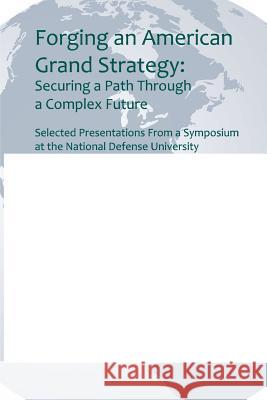Forging an American Grand Strategy: Securing a Path Through a Complex Future » książka
Forging an American Grand Strategy: Securing a Path Through a Complex Future
ISBN-13: 9781503098145 / Angielski / Miękka / 2014 / 138 str.
On November 8-9, 2011, the National Defense University (NDU), Washington, DC, held a conference entitled "Forging an American Grand Strategy: Securing a Path Through a Complex Future," which I had the privilege of chairing. For more than 2 decades, I have been studying the mechanisms and methods we use as a nation to develop and conduct grand strategy. The conversation that began at that conference needs to be further developed and continued. More importantly, we, as a nation, need to explore together the path ahead and answer questions regarding how and why we struggle with grand strategies. If developed and executed with a systemic orientation, grand strategies could help us shape our future in an ever changing and complex world. This volume represents a compilation of some of the presentations given at the NDU conference. It also represents the great diversity of opinions regarding this subject. For more than 2 decades, it has been evident to many that the United States needs a new framework for a grand strategy, especially since the "containment" strategy of George F. Kennan that shaped U.S. policy during the Cold War is no longer relevant. But, what kind of framework do we need? Most commonly, grand strategy is framed in the context of warfare, or at least conflict among nations. There have been exceptions, and the focus of this symposium was not on warfare or preparation for war. Our intent was to promote a discussion about the elements of and prospect for a grand strategy for America. Over the millennia, grand strategies have evolved as the complexities of the known world grew. Rulers have created and executed grand strategies for their nations through modern times. It is possible that a 21st century grand strategy will be very different than past models since our understanding of the world has and will change our understanding of how complex systems, including nations, behave. The empowerment of individuals or small groups with new technologies and communication tools can extend beyond anything imagined outside the realm of science fiction. Other factors may come into play as well. Some would also argue that, in a democracy, it is not possible to attain the necessary consensus to craft and implement a national grand strategy in the absence of an existential threat. Recent political discourse lends some credence to that line of reasoning.
Zawartość książki może nie spełniać oczekiwań – reklamacje nie obejmują treści, która mogła nie być redakcyjnie ani merytorycznie opracowana.











